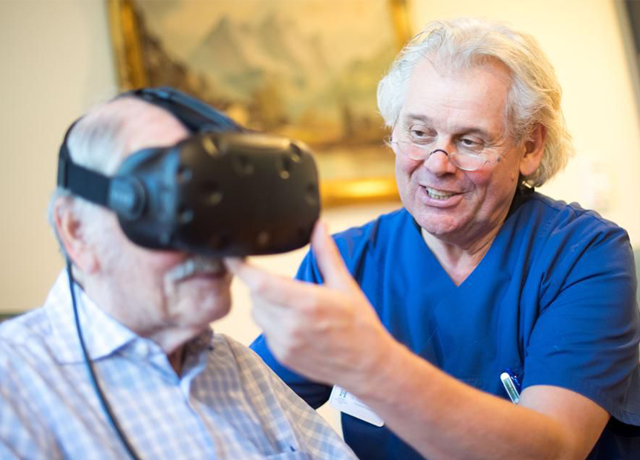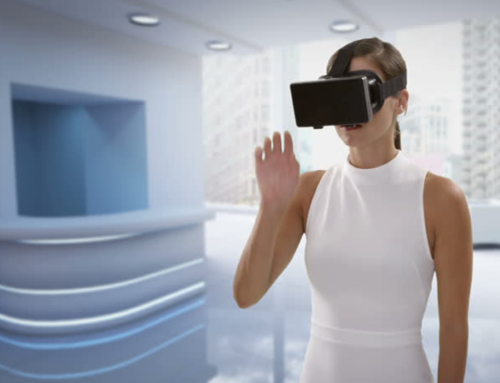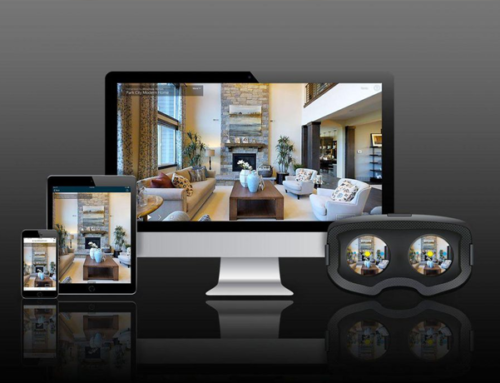TORONTO, ON – FEBRUARY 14 – Tess Baird uses the VR headset while Dr. Ben O’Sullivan looks on.
Virtual Reality isn’t just for gamers. A new project between SickKids and Sunnybrook uses VR headsets to ease pre-surgery anxiety. Patients watch immersive video of the surgery process: wheeled down the hallway, getting anesthesia, waking up. Pre-surgery anxiety has affects that spill over even after surgery. (Carlos Osorio/Toronto Star via Getty Images)
VR is no longer just a source of gaming entertainment. Over the past 12 months, astounding technological advances coupled with seismic shifts in our healthcare sector toward “value-based care” (wherein quality, safety, and outcome are primary determinants) are opening the door to its effective clinical use. The immersive technology is being studied as a treatment modality for a broad swath of health-related issues, including: to lessen acute pain; to treat psychiatric conditions such as phobias, anxiety disorders and addictions; to provide cognitive training and improve limb function in those with neurological disorders; and to assist with and accelerate physical rehabilitation. In addition, it holds particular promise for accelerating medical education (like how quickly and safely a surgical trainee like me can learn to do transplants), modifying an unhealthy behavior such as smoking, personalizing therapies to the individual, and improving compliance to prescribed treatment regimens.
How does VR work for healthcare?
A useful framework for understanding the application of VR in medicine and health has been proposed by one of the field’s leaders, Albert “Skip” Rizzo, PhD, of the University of Southern California’s Institute for Creative Technologies. Dr. Rizzo organizes applications into broad categories based on the underlying effects, which include:
- Distract and Expose: VR can distract and redirect attention away from unpleasant stimuli such as pain, or traumatic thoughts, or fears, allowing a patient to spend time with calming activities like strolling leisurely in the woods, watching a memorable sunset, or relaxing on a favorite beach. It can also provide effective graduated exposure therapy for specific phobias or post-traumatic stress disorder, or help recovering addicts with triggering stimuli.Mathew Stoudt, CEO of appliedVR, works with hospitals across the country to address pain relief virtually. “Healthcare providers are using our therapeutic VR pain platform in a wide variety of use cases ranging from helping women abate pain during labor to reducing sedation levels during post-op pin removals to mitigating pain and anxiety during chemo-therapy sessions,” Stoudt explains to me.
- Motivate and Measure: VR can motivate patients to engage in rehabilitation therapy through technology similar to that used to create games, making the treatment fun or competitive (Imagine wielding a sword or climbing a mountain to stimulate arm or leg lifts). Powerfully, VR also allows for analytical measurement since it can be augmented with real-time sensors to measure head position, gaze, and limb movement, all of which can be used to evaluate compliance with therapeutic motions.
- Engage: Because VR so intensely captures one’s attention and focus in a way that a book, television or computer screen cannot, it is an especially effective tool for learning by simulating unique or challenging situations. Patients can be taken on virtual tours of the human body to see in detail how high blood pressure irreparably damages the heart muscle, or how smoking destructs the delicate protective cilia of the lung. The learning possibilities are endless.
Furthermore, the immersive virtual reality experience improves retention. A University of Maryland study released this June found that individuals had an 8.8% improvement overall in recall accuracy using a VR headset compared to more traditional two-dimensional platforms like a desktop computer or tablet.
In some hospitals and universities, virtual reality, as well as its close cousin augmented reality (picture a variation of Google Glass), are already making a difference. Leading healthcare organizations including Cedars-Sinai Medical Center, Inova Health, University of Pittsburgh Medical Center, Boston Children’s Hospital and Duke University Medical Center have all actively put them to use. At Duke, women receiving chemotherapy for breast cancer suffered fewer adverse effects and less fatigue when participating in VR immersions that included touring an art gallery or deep-sea diving while receiving their chemo treatments. Paralyzed patients participating in the Walk Again Project regained partial sensation and muscle control through brain-machine interfaces that included VR. Cedars-Sinai is using VR goggles showing soothing scenes to treat hospitalized patients experiencing pain, with one study showing patients reporting a 24% reduction in pain after using the goggles. At Boston Children’s, kids and their families are getting a better understanding of diagnoses and treatments through an immersive, 3D environment that lets them tour the body and better visualize medical findings.
And in medical schools, one can imagine the advantage of virtual reality being more extensively incorporated, as we are increasingly faced with cadaver shortages, and traditional surgical training simulators are far from the real thing.
As a trainee surgeon, rather than waiting days and sometimes weeks on end to learn by observing the next transplant procedure to be performed, with VR I could have daily placed myself “in the virtual OR,” observing and rehearsing the rare operation. Surgeons today could safely walk through and practice their most difficult and challenging cases before actually operating on the live patient. Being able to repeatedly practice a technique virtually before going into the field will substantially reduce medical errors and greatly enhance patient safety and outcome. Augmented reality can assist in real-time surgeries as surgeons don headsets that provide relevant imaging data and patient information that appears and disappears with the wave of a hand.
Emergency medical responders could fine tune their critical lifesaving responses to a broad range of varying scenarios over the course of an afternoon.
And finally, the big idea.
Our nation—on average when compared to other advanced economies—spends twice as much per capita on health, yet our outcomes measured by survival and infant mortality are at best only mediocre. To correct this, too often our well-intended policymakers and journalists focus exclusively on modifying our healthcare “system.” But what we know today is that behavior has a much larger and more significant impact on spending as well as on the overall health of our citizens— choices people make and how they act, eat, sleep, work, and play.
Some of this work is already underway.
One cutting edge Louisville-based company, BehaVR, is using VR to create an alternative delivery system for behavioral and mind-body health that will educate, motivate, and activate healthy behaviors. “So much of our health is either directly or indirectly influenced by how we live our lives, how we process the stressors and negative influences that we experience every day,” explains BehaVR founder Aaron Gani. “We’re helping people cultivate emotional regulation and make more mindful choices. If experience is the best teacher, and if a patient can experience alternative futures of either diminished or enhanced health capacities as a result of behaviors, we can give them a unique perspective or motivation to make different, healthier choices in the moment.”
Friedhelm Caspers, head geriatrics physician, putting a pair of virtual reality glasses on a dementia patient in Crefeld, Germany. Digital assistance should slow down the processes of dementia and alzheimers. Patients can move through street scenes from the 1950s and thereby take a trip into their own past. Photo: Marius Becker/dpa (Photo by Marius Becker/picture alliance via Getty Images)
The opioid epidemic is another sphere of potential application. With VR’s potential to therapeutically modify behavior, the opportunities to address opioid and other addictions are being actively explored. For example, Noah Robinson, a doctoral student in clinical psychology at Vanderbilt, has spent years studying how VR can treat addiction. “By exposing patients to engaging games and activities that fully captivate their minds, those struggling with addiction reported feeling calmer, more focused, and better able to regulate their emotions following the VR immersion,” Robinson explains to me. The goal is to establish an alternative behavior that recovering addicts can turn to when feeling a craving. Robinson speculates, “If we can make the VR intervention as accessible as the drug, then perhaps we can prevent relapse.”
Yes, we are on the cusp of a new era in provider education and patient engagement, with one projection estimating total spending on augmented and virtual reality products and services to balloon from $9.1 billion in 2017 to nearly $160 billion in 2021. Specifically for health, the trends for increased investment are huge. Zachary Rosenthal, Ph.D., a Duke University professor in psychiatry and behavioral sciences who has extensively studied the clinical use of virtual reality, explains: “The decreasing cost of hardware and software, and the move to value-based pay and population health, is creating opportunity for investment in VR.”
For years, the high price of this technology has relegated it to small clinical studies, but with costs plunging and technology advancing, its incorporation into care will almost certainly exponentially increase over the next two years.
What will be the likely outcome? Overall health learning will be rapidly accelerated and much more deeply retained. Patients will more thoroughly understand and be motivated to practice healthy behaviors. More completely comprehending the highly personalized and life-changing impact of compliance to therapeutic instructions, patients will be more likely to take their prescribed medicines for hypertension or diabetes, improving health and wellbeing. Doctors will be more skilled and their surgeries safer.
All in all, patients will be healthier, stay out of hospitals, and overall costs in healthcare will fall. Immersive virtual reality has an exciting role to play in the future of medicine, and as it increasingly becomes the standard of care, the health and wellbeing of our citizens will improve.









